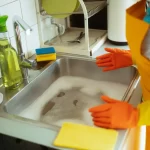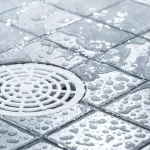Clogged and blocked drains are a complete pain. They can bring your entire household to a grinding halt, which is why you need to be able to deal with the issue now and into the future. Here are the most common reasons you’ll be calling your local Toronto drain cleaning contractor to fix a blocked drain in your home. We’ll discuss how to deal with them, and how to stop them from causing blockages in the future.
1. Feminine Care Products
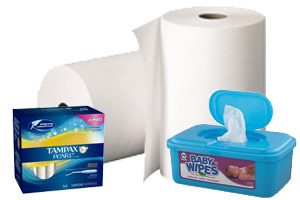
To be fair, feminine care products are often singled out when there are a host of similar bathroom products that can clog up toilets and sinks just as easily. Paper towel is perhaps the most notorious, but certainly tampons have caused their fair share of toilet troubles. Cotton-tipped swabs are also common culprits, as are diaper wipes.
The solution: Unfortunately, these types of products are usually lodged into their chosen spot pretty tightly, so the normal de-clogging methods may prove ineffective. To get rid of swabs and tampons, you may have to call in the professionals. Trained and experienced plumbers can use something called a “drain snake,” which they can stick down the drain. When it’s in the right spot, the drain snake will break up everything in the clog and get your drains working just fine all over again.
Preventative maintenance: The absolute easiest solution for stopping these kinds of products from clogging up your pipes is to simply not have them in there to begin with. Put discrete waste baskets, preferably ones with a lid that hides the contents, within arm’s reach of all your toilets, which provides a place for people to use the products they need and get rid of them without incident. As for diaper wipes, get a waste basket in the change room and put it out with the appropriate trash.
2. Human Waste
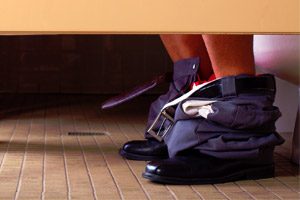
Now, the first thing going through your mind is probably excrement, but hair, nail clippings, and skin tissue are also common causes of clogs and blockages in drains and sinks. These have a tendency to accumulate with time, where a few pieces of hair will trap more hair until you have a clump of it sitting in the bathroom sink’s u-bend. In bathrooms especially, human byproducts are probably the most common cause for clogs and blockages.
The solution: Being so common, many of us know what to do when faced with this clog: get out the plunger. Excrement especially often just needs an extra bit of encouragement to continue its journey to the local sewage supply, but hair and other products may need some serious elbow grease. When using a plunger in your bathroom sink, be sure to cover up the relief hole on the edge of your sink, usually at the point closest to you. And if you’re having trouble getting a solid seal on the drain, use some petroleum jelly to help it stay airtight.
Preventative maintenance: Unfortunately, some of this isn’t preventable. Well, at least in the case of excrement there is little you can do. But for hair and nails, you can start by putting nail clippings in the garbage, not the toilet or sink. As for hair, try installing a simple trap on the sink to catch things like hair, and be dutiful in dumping it into the garbage instead of the sink.
3. Food Waste
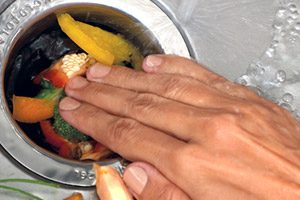
Kitchen sinks aren’t usually subject to clogs from the above products, but they are still hot spots for drain and sink issues. The main culprit, unsurprisingly, is food waste. Scraps of food can get lodged into the drain quite easily, which quickly leads to complete blockage of your kitchen sink. Potato peels, chunks of onion, and seeds are probably some of the most common food waste products that can ruin your kitchen sink.
The solution: The solution to this problem is just like human hair: get a plunger and get to work. Start by putting a layer of water in the bottom of the sink and get to plunging. Another solution is to pour boiling hot water down the sink in the hopes that will break things up. It’s surprisingly simple but often gets the job done.
In more extreme circumstances, you can use either a liquid drain cleaner or a mixture of vinegar and baking soda. These products should be used sparingly, however, since they can cause damage to your pipes if used too often.
Preventative maintenance: While many people think a garbage disposal unit in the sink, often called a “garburator,” is the best solution for this problem, it’s actually a bad idea.
These products have been causing havoc on municipal water systems since their invention, and many places are starting to ban them as a result. Instead, the best preventative maintenance is a combination of traps, like the ones in the bathroom to catch hair, and using the garbage instead of the sink for food preparation, be sure to thoroughly wipe all food products off of your plates before putting them in the dishwasher or cleaning them in the sink, and take care to peel potatoes into the organic waste bin. This solution actually has an added benefit if you’re a gardener: you’re helping to make your own fertilizer by keeping your organic waste all together.
Getting your sinks and drains cleared can be a challenge, especially since individual products can call for individual responses. Before tackling any clog or blockage, be sure to think about what the product that’s likely causing the problem. Then, choose the right method for clearing away the blockage. If the problem persists, be sure to call a trained professional. Only a trained and certified plumbing professional will have the experience and know-how necessary to locate the problem, deal with the issue, and pinpoint if any additional work is needed to stop the problem from happening again. No matter what, it’s always a good idea to use traps and common sense about your drains and sinks.




